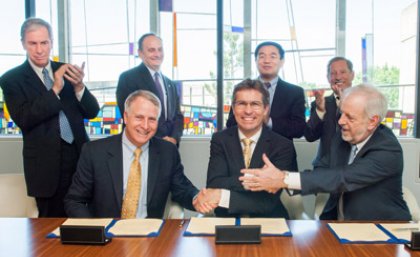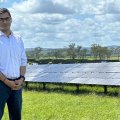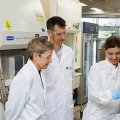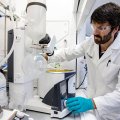
An alliance that combines Queensland’s research excellence with the market capabilities of a leading US research university could drive new cancer treatments and infectious disease vaccines to market sooner.
The University of Queensland (UQ) and the Queensland Institute of Medical Research (QIMR) will sign an historic, 10-year alliance with Emory University (Georgia, USA) on Friday 14 December to collaborate on new drugs and vaccines for preventing and treating cancer and infectious diseases.
The Queensland Emory Development (QED) Alliance will build on existing, smaller-scale collaborative relationships between the three institutions to generate a pipeline of exciting commercial opportunities from synergistic small molecule drug and biologics research.
UQ Vice-Chancellor and President, Professor Peter Høj, said the QED Alliance represented an excellent opportunity for Queensland-based research groups to access the capabilities of the US’s fourth largest public sector contributor to drug discovery.
“UQ, QIMR and Emory share common goals in addressing global health challenges through research collaborations,” Professor Høj said.
“Aligning the research strengths of UQ, QIMR and Emory in infectious disease, oncology, drug development and clinical translation with the Emory Healthcare system of hospitals and clinics makes the QED a particularly exciting global partnership for producing innovative drug and vaccine solutions.”
“International collaborations help researchers to access grants offered in other countries, including Australia and the US, where having an ‘in country’ link is a considerable advantage.”
“We welcome Emory President, Dr James Wagner, and his distinguished colleagues to UQ and QIMR for the signing of this historic inter-institutional agreement, and look forward to hosting the recipients of the first travel bursaries in early 2013,” said Professor Høj.
The QED Alliance will seek to leverage its defined research collaborations with additional industry, government and philanthropic support beyond the level that one research institution could achieve on its own, and therefore accelerate the transfer of discoveries into consumer-ready medicines.
In particular, it will focus on building awareness among the three institutions’ researchers of opportunities within their respective fields - knowledge of the resources and facilities that are available as part of the collaboration which can be utilised to make drug development in infectious disease and oncology a more efficient process.
The Alliance is one of several initiatives with Emory University that UQ’s main research commercialisation company, UniQuest, has introduced over the past two years to support UQ’s discovery and engagement objectives.
UniQuest connected UQ researchers with Professor Dennis Liotta, Director of the Emory Institute of Drug Development, who will also receive a Honorary Doctorate in Science from UQ on Friday. This productive relationship has helped to establish a number of oncology collaborations as well as a start-up company, QUE Oncology, for raising venture capital to fund the development of small molecule drug candidates and biological targets.
ENDS
Media: Janelle Kirkland, UQ Communications, j.kirkland@uq.edu.au or 07 3346 0561.
BACKGROUND
Emory University is one of America’s leading research universities, building on a unique combination of campus-based resources and global partnerships. The Emory campus includes 1.7 million square feet of research space, and scientists have attracted more than $500 million in external research funding for the past three years. Emory has an outstanding program in drug development and technology transfer. Its Woodruff Health Sciences Center includes leading schools of medicine, public health, nursing, a primate research center, and the Emory Healthcare system of hospitals and clinics.
The Queensland Institute of Medical Research (QIMR) is a world leading translational research institute. Our research focuses on cancer, infectious diseases, mental health and a range of complex diseases. Working in close collaboration with clinicians and other research institutes, our aim is to improve health by developing new diagnostics, better treatments and prevention strategies.
QIMR gratefully acknowledges the support of the Queensland Government.
For more information about QIMR, visit www.qimr.edu.au
The University of Queensland (UQ) is one of Australia's premier learning and research institutions. UQ is Queensland's oldest university and has produced more than 200,000 graduates since opening in 1911. Measured through a combination of three key global university rankings — The Times Higher Education, the QS World University and the Academic Ranking of World Universities — UQ is currently ranked in the top 100 of all universities worldwide. UQ is a founding member of the national Group of Eight (Go8) - a coalition of leading Australian universities.











